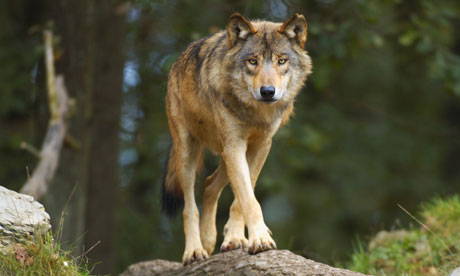A study of Slovakian shepherds and their sheep, and another comparing Austrian hunters with Austrian butchers
- guardian.co.uk

The methods identified by researchers for
protecting sheep from wolves may seem obvious, but apparently not to
Slovakian shepherds. Photograph: Alamy
When you hobnob with Slovakian shepherds, don't mention wolves. A new study called Mitigating Carnivore-Livestock Conflict in Europe: Lessons from Slovakia, says: "Compared to other sectors of society shepherds had the most negative attitudes, particularly towards wolves."
Wolves are again roaming the forests of Slovakia. They were almost wiped out in the mid-20th century, then reappeared thanks to a 30-year moratorium on hunting. Now the small-but-growing wolf population has restored its tradition of helping local livestock go missing or be mauled.
The researchers, Robin Rigg and Maria Wechselberger at the Slovak Wildlife Society, Slavomir Findo at the Carpathian Wildlife Society, Martyn Gorman at the University of Aberdeen, and Claudio Sillero-Zubiri and David Macdonald at the University of Oxford, published their work in the journal Oryx.
They found that, mostly, wolves grab sheep near the edge of a forest, especially if the shepherds employ what the scientists call "ineffective methods (chained dogs and inadequate electric fencing)".
Experimenting, the team identified two effective methods: unchained guard dogs and adequate fencing.
As with much research, the obvious was apparently not obvious beforehand to all who needed to know about it.
That's the story with shepherds. Now, for people who kill lots of animals: hunters and butchers. A study by an Austrian/British/Malaysian team probes the psychological differences between them.
The monograph, Multi-Method Personality Assessment of Butchers and Hunters: Beliefs and Reality, appeared last year in the journal Personality and Individual Differences. The authors, Martin Voracek, Stefan Stieger and Viren Swami, learned, through direct questioning, that 102 Austrian university students feel hunters and butchers have "higher aggressiveness and masculinity". The students also seem to believe that hunters — but not butchers — possess unusually high self-esteem.
The researchers then studied 25 hunters and 23 butchers from rural Lower Austria, and compared them with 48 persons who neither hunt nor butcher.
First, they tested for hypermasculinity, using a survey technique that "gauges macho personality". They verified their findings "unobtrusively", by doing an analysis based on the relative lengths of each person's second and fourth fingers.
Then they used a standard test to measure each person's self-esteem. They double-checked by having each individual rate "the likeability of all letters of the alphabet", bearing in mind that "letters appearing in individuals' names, especially their initials, are rated more favorably than the remainder of the alphabet".
All told, the researchers "found little evidence for the factuality of" hunters or butchers having great masculinity, aggressiveness, or self-esteem.
(Thanks to Greg Wells for bringing the Slovakian shepherds to my attention.)
• Marc Abrahams is editor of the bimonthly Annals of Improbable Research and organiser of the Ig Nobel prize
Source
Wolves are again roaming the forests of Slovakia. They were almost wiped out in the mid-20th century, then reappeared thanks to a 30-year moratorium on hunting. Now the small-but-growing wolf population has restored its tradition of helping local livestock go missing or be mauled.
The researchers, Robin Rigg and Maria Wechselberger at the Slovak Wildlife Society, Slavomir Findo at the Carpathian Wildlife Society, Martyn Gorman at the University of Aberdeen, and Claudio Sillero-Zubiri and David Macdonald at the University of Oxford, published their work in the journal Oryx.
They found that, mostly, wolves grab sheep near the edge of a forest, especially if the shepherds employ what the scientists call "ineffective methods (chained dogs and inadequate electric fencing)".
Experimenting, the team identified two effective methods: unchained guard dogs and adequate fencing.
As with much research, the obvious was apparently not obvious beforehand to all who needed to know about it.
That's the story with shepherds. Now, for people who kill lots of animals: hunters and butchers. A study by an Austrian/British/Malaysian team probes the psychological differences between them.
The monograph, Multi-Method Personality Assessment of Butchers and Hunters: Beliefs and Reality, appeared last year in the journal Personality and Individual Differences. The authors, Martin Voracek, Stefan Stieger and Viren Swami, learned, through direct questioning, that 102 Austrian university students feel hunters and butchers have "higher aggressiveness and masculinity". The students also seem to believe that hunters — but not butchers — possess unusually high self-esteem.
The researchers then studied 25 hunters and 23 butchers from rural Lower Austria, and compared them with 48 persons who neither hunt nor butcher.
First, they tested for hypermasculinity, using a survey technique that "gauges macho personality". They verified their findings "unobtrusively", by doing an analysis based on the relative lengths of each person's second and fourth fingers.
Then they used a standard test to measure each person's self-esteem. They double-checked by having each individual rate "the likeability of all letters of the alphabet", bearing in mind that "letters appearing in individuals' names, especially their initials, are rated more favorably than the remainder of the alphabet".
All told, the researchers "found little evidence for the factuality of" hunters or butchers having great masculinity, aggressiveness, or self-esteem.
(Thanks to Greg Wells for bringing the Slovakian shepherds to my attention.)
• Marc Abrahams is editor of the bimonthly Annals of Improbable Research and organiser of the Ig Nobel prize
Source

No comments:
Post a Comment